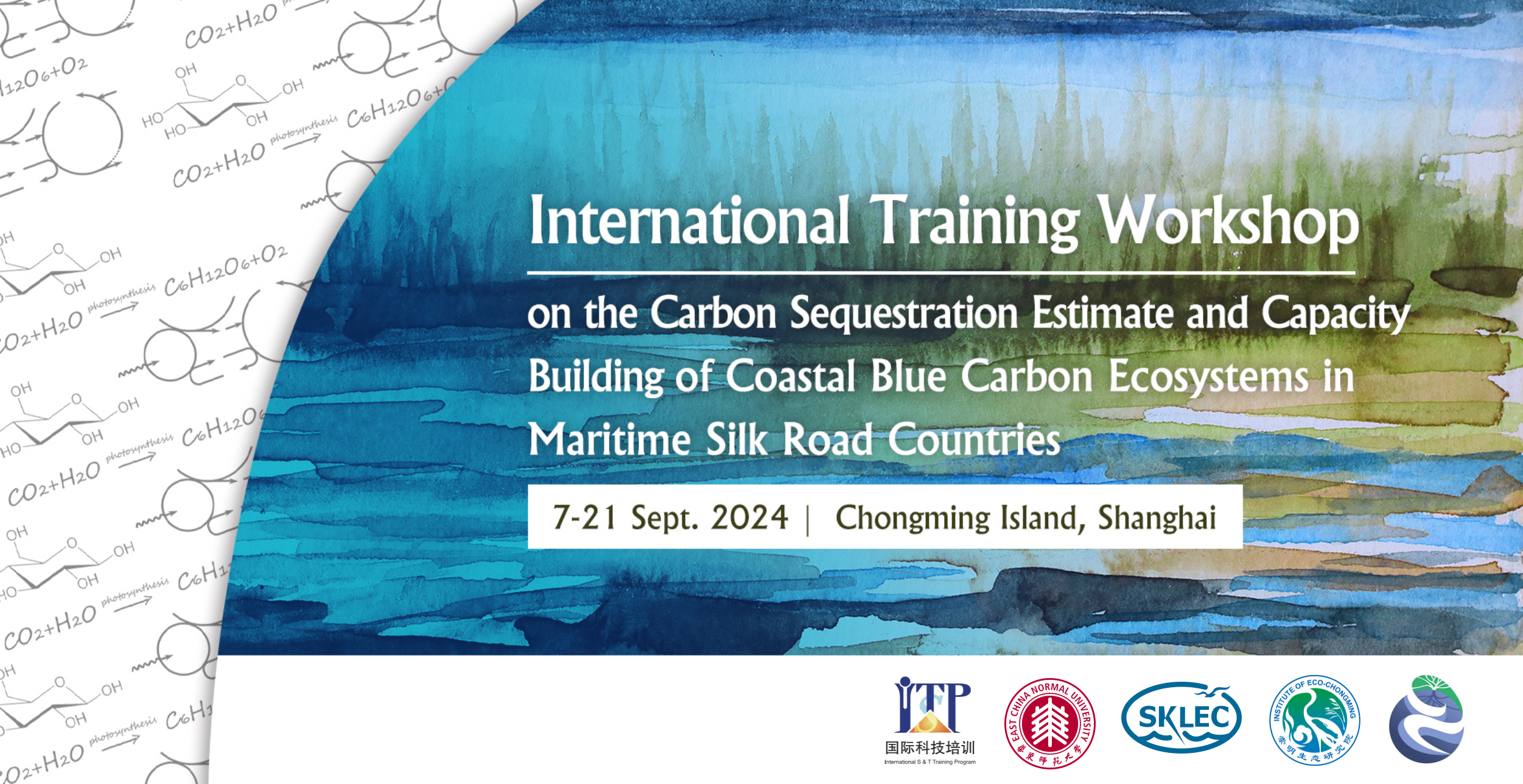
Sponsored by Department of International Cooperation, Ministry of Science and Technology of the People's Republic of China, “International Training Workshop on the Carbon Sequestration Estimate and Capacity Building of Coastal Blue Carbon Ecosystems in Maritime Silk Road Countries (CBC-MSR)” will be held in Chongming Island, a world-class ecological island, Shanghai, China during 7-21 September 2024.
1. Objectives
Tidal wetlands are significant coastal blue carbon ecosystems and are recognized as additional means to achieving carbon neutrality. The coastal wetland carbon sinks were agreed to be included in the national greenhouse gas inventory by the Intergovernmental Panel on Climate Change (IPCC) in 2013. Accounting for coastal wetland carbon stocks has posed formidable challenges to many member states due to the lack of expertise in the responsible agencies; only a few states have reported it to the United Nations so far. Scientists at East China Normal University and its collaborating institutions have accumulated a vast amount of scientific information on the wetlands over several decades. Sponsored by the Ministry of Science and Technology of the People's Republic of China, the State Key Laboratory of Estuarine and Coastal Research (SKLEC) aims to develop a training workshop for industries, governments, and students to accurately count the carbon sequestration rate of tidal saltmarshes. This project encompasses experimental design, data acquisition and processing, predictive models, and on-site fieldwork. It will encourage trainees to develop low-cost novel observation tools for managing saltmarshes. The training workshop will further contribute to the protection and restoration of coastal blue carbon ecosystems and the establishment of blue carbon trading systems in China and other countries along the Belt and Road.
2. Training includes
——Lectures (Topics to be covered)
· Why do we care about the carbon?
· Where is the blue carbon?
· What is a salt marsh?
· Where is the blue carbon in the salt marsh?
· How does carbon move from the air to plants and soil and from the air/sea (gaseous to solid states)?
· How do we measure the rates of these movements (fluxes)?
· How can we report the (additional) annual amount of carbon stored in salt marshes to the United Nations?
· What is Carbon Negative Emission Technology and Nature-based Solutions for Coastal Blue Carbon Ecosystems?
——Fieldwork and visits
· On-site field investigation (unvegetated tidal flats, naturally vegetated salt marshes, restored salt marshes)
· Study of indoor analysis methods (deposition rate measurement methods, particulate organic carbon (POC), sediment organic carbon (SOC) measurement methods)
· Wetlands visits
——Group discussion:
Novel ideas to increase the amount of coastal blue carbon (salt marshes) and sustain its potential to sequester atmospheric carbon dioxide
——Report:
Trainees submit their field reports to the instructor individually
3. Application Eligibility
The organizers welcome marine and ecological graduate students and researchers, experts and technicians from enterprises and international organizations, and staff from government agencies, all based in the Maritime Belt and Road Program participating countries and other developing countries. Applicants must hold a Bachelor’s degree or an equivalent qualification.
Please complete an online application at https://mostitp.cistc.gov.cn/student_login.aspx. Meanwhile, send following documents to the organizing committee at CBCMSR@ecnu.edu.cn with the email subject as [Application of CBCMSR2024 – ‘Your Name’] by 26 July 2024. The review will be conducted concurrently with the application process until all trainee positions are filled.
-CV (in a separate PDF, including education background, professional experiences, important publications, etc.)
-Related photos (JPG or PNG format, up to 10MB/image) and/or videos (MP4 format, up to 200MB/video) you would like to share along with your questionnaire
The organizing committee will review applications, select 20 trainees, and send invitation letters no later than 3 August 2024.
Before the training workshop, each trainee must submit a report on Coastal Blue Carbon development in their country. In cases where there are multiple applicants from the same country, one participant will be assigned to complete this task.
By completing the training courses, the trainees will receive a certificate issued by the Ministry of Science and Technology of the People's Republic of China.
5. Chair
Prof. Jinzhou Du, State Key Laboratory of Estuarine and Coastal Research, East China Normal University
6. Contact
CBC-MSR Organizing Committee
Email: CBCMSR@ecnu.edu.cn (Ms. Qin)
Tel: 86-021-54836463
Fax: 86-021-54836458
7. Related links
International Training Program, Ministry of Science and Technology of the People's Republic of China
International Cooperation & Exchange Division, East China Normal University
Global Education Center, East China Normal University
State Key Laboratory of Estuarine and Coastal Research (SKLEC)
Institute of Eco-Chongming (IEC)
Download link:
Questionnaire CBC-MSR Questionaire.docx
Brochure Brochure CBC-MSR.pdf
If the above links do not work, you can download here https://drive.google.com/drive/folders/1cc688oL7i2jDSD967J4HnhZcX74TDqyU?usp=sharing
中文版招生通知:https://imber.ecnu.edu.cn/10/e8/c44577a594152/page.htm








